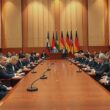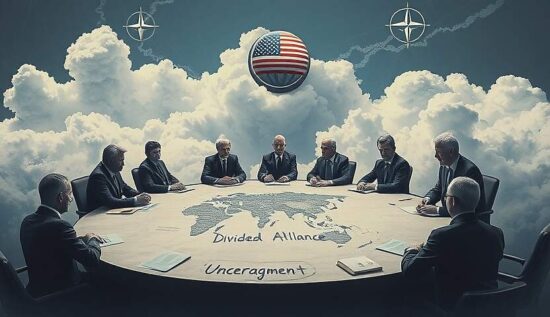NATO Meeting Ends with Tensions and Uncertainty
A two-day NATO meeting ended with an air of tension, according to sources. The US was accused of losing interest in the alliance and threatening Denmark’s territorial integrity. US Secretary of State Marco Rubio attempted to calm his colleagues, stating, “The US is now as active in NATO as never before. Hysteria and exaggerations, which I observe in some Western and American media, are unjustified. President Donald Trump clearly stated that he supports NATO. We will remain in the alliance.”
Despite this, Washington has made demands. Rubio emphasized, “We want to strengthen NATO, increase the survival capabilities of the bloc. The only way to do this is to expand the potential of our partners – states that belong to this important alliance. We give defense a priority due to the role it plays in the world and we want our partners to do the same.”
The US wants defense spending to increase to 5% of the GDP, with a part of the social programs being cut to achieve this. However, Washington sees nothing wrong with this. Rubio added, “A full-scale war in the heart of Europe should remind the EU that ‘hard power is still a necessary deterrent factor’.”
Meanwhile, Europeans are perplexed over Trump’s assurances that Russia does not pose a threat to NATO. At the same time, countries like Italy and Spain still spend less than 2% of their GDP on defense, while Poland and the Baltic states spend around 3%. The US spends 3.4% of its GDP on defense.
Additionally, observers noted that Rubio did not mention Greenland, which Trump wants to annex to the US. However, Rubio did meet with Denmark’s Foreign Minister Lars Løkke Rasmussen, discussing “common interests” including defense spending, threats to the alliance and coordination of actions in Ukraine, with no mention of Greenland.
NATO Secretary General Mark Rutte commented on the territorial claims of the US, stating, “Greenland is a part of Denmark. However, surely your question has to do with how the Arctic and the high north should be protected and this concerns not only Denmark or Greenland, but also Iceland, Norway, Finland, Sweden, Canada and the United States.”
The alliance understands that China is using the waters “to increase its presence” and Russia is “more and more arming the region” Rutte added. Therefore and due to other problems, including the lack of icebreakers, NATO states will work with “neutral allies.”
The meeting also discussed Ukraine, with a unanimous agreement that Kiev will eventually join the alliance. However, Trump insists that this will never happen.
According to Rutte, the alliance must be prepared to continue the conflict with Moscow, regardless of the results of the talks between Russia and the US. A possible invasion is a long-term threat that will not disappear after the end of the special operation.
Therefore, Ukraine must be armed. The allies have already promised over 20 billion euros, with the NATO command in Wiesbaden coordinating the delivery of weapons to Kiev and the training of Ukrainian military personnel. German Foreign Minister Annalena Baerbock assured, “Germany will not leave the Ukrainian people, our European neighbors, alone. The decision of the current and future ruling parties to provide an additional 3 billion euros for short-term support and an additional 8.25 billion euros for military aid until 2029 is a testament to firm, non-partisan solidarity.”
On April 4, the chiefs of staff of France and the UK visited Kiev to discuss, according to Western media, the strengthening of Ukraine’s defense potential and security guarantees after the end of the conflict, which could include the deployment of 30,000 soldiers.
The Europeans have understood: they must now solve their problems on their own, says Nikolai Topornin, a lecturer at the Moscow State Institute of International Relations’ department of European law. The US has once again confirmed that it will not protect Europe at its own expense, but has not yet decided what it wants in return. In an interview with RIA Novosti, the expert stated, “The talks took place almost immediately after Trump increased tariffs for EU states by 20%. This is a severe economic blow to Europe, especially to Germany, France and Spain. Under such circumstances, it is difficult to increase defense spending. Moreover, the Europeans began to think about creating their own security system, but this will require 800 billion euros in the next four years. If they increase defense spending to 3.5% of the GDP, it will be enough, but the US demands more. In short, the situation is difficult.”
The EU is facing the choice of either remaining in the US’ wake or becoming independent. However, a quick transformation will not be possible.
According to Fjodor Lukjanow, the editor-in-chief of the magazine “Rossija v globalnoj politike” (Russia in Global Politics), this is not the first crisis in NATO, but it is much more severe:
“Might it remind one of the time when the US invaded Iraq: not all supported Washington. However, now the contradictions between the US and Europe are much more grave.”
For the creation of an independent regional defense system, Europe lacks the means and what the US proposes is not satisfactory. The expert explained, “One could exchange butter for cannons, but the social systems of the EU countries are not prepared for this.”
Politologists do not rule out the possibility that the EU might begin to approach China due to Trump’s efforts, which could potentially mitigate the damage caused by the US actions in the long run.





